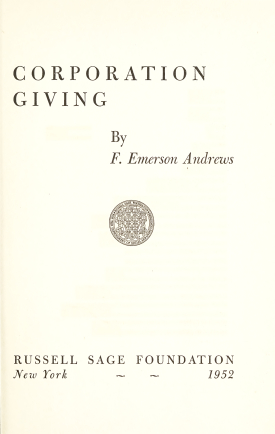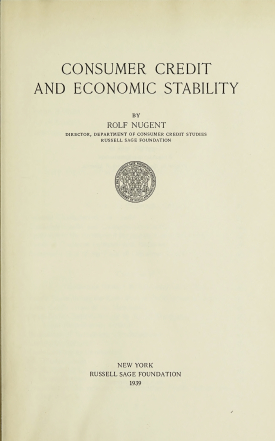Racial disparities exist throughout the criminal justice system and are particularly prominent in bail setting decisions. Black felony defendants are 10 percent more likely than white defendants to be detained before trial. These racial disparities may reflect rushed judicial decision making and biased beliefs about the relative risk of defendants based on race.
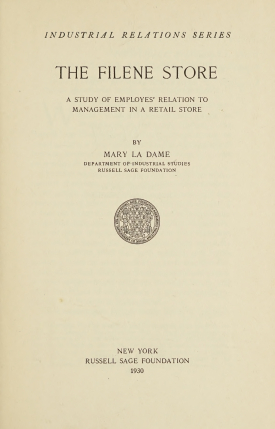
The Filene Store
About This Book
With a foreword by Mary Van Kleeck. Part of the Industrial Relations Series, a series by the Department of Industrial Studies of the Russell Sage Foundation investigating early twentieth-century experiments in the organization of relations between employers and employees in industrial enterprises in the United States. This volume examined William Filene’s Sons Company, a Boston department store, particularly the development of its human relations as an integral part of its business aims and its methods of management.
Mary La Dame, Department of Industrial Studies, Russell Sage Foundation
Download
RSF Journal
View Book Series
Sign Up For Our Mailing List
Apply For Funding
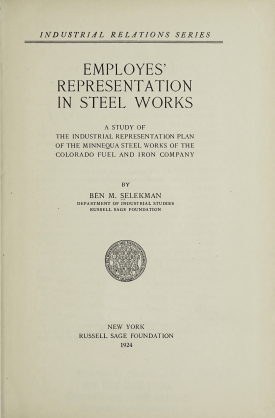
Employes’ Representation in Steel Works
About This Book
With a foreword by Mary Van Kleeck. Part of the Industrial Relations Series, a series by the Department of Industrial Studies of the Russell Sage Foundation investigating early twentieth-century experiments in the organization of relations between employers and employees in industrial enterprises in the United States. How a company, which operated more than twenty bituminous coal mines, a large steel works, and a railroad in Colorado, undertook to organize its relations with its workers by instituting a plan of “employes’ representation” is the subject of two studies, one on coal mines and one on steel works.
Ben M. Selekman, Department of Industrial Studies, Russell Sage Foundation.
Download
RSF Journal
View Book Series
Sign Up For Our Mailing List
Apply For Funding
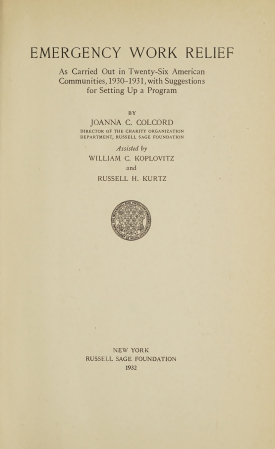
Emergency Work Relief
About This Book
Material for this study was collected during the summer and early autumn of 1931, in response to a request from the President’s Organization on Unemployment Relief. Thirty communities were visited, and the reports on work relief carried out in 26 of them, chiefly situated in the middle, eastern, and southern states, can be found in Part II.
Joanna C. Colcord was director of the Charity Organization Department of the Russell Sage Foundation. Assisted by William C. Koplovitz and Russell H. Kurtz.
Download
RSF Journal
View Book Series
Sign Up For Our Mailing List
Apply For Funding
About This Book
This 1952 volume documents philanthropic contributions and policies of corporations. Part I presents a factual picture of corporate giving, including its historical development as well as its scope and problems. Part II discusses the beneficiaries of corporate giving, with suggestions on making wise choices, and separate sections on the more important agencies or groups of agencies, including institutions of higher education. Part III deals with legal and tax factors.
F. Emerson Andrews was director of publications at the Russell Sage Foundation.
Download
RSF Journal
View Book Series
Sign Up For Our Mailing List
Apply For Funding
About This Book
This 1939 book deals with consumer credit – particularly, it examines the consumer as a determining factor in economic events through quantitative aspects of consumer credit. It includes year-end estimates of the outstanding amounts of various types of consumer credit covering the period from 1923 to 1937 and it attempts to interpret the influence of expansions and contractions of the aggregate indebtedness of consumers upon the total flow of goods and services which constitute the real national income. It includes a history of consumer credit from before the Civil War to the twentieth century.
Rolf Nugent was director of the Department of Consumer Credit Studies at the Russell Sage Foundation.
Download
RSF Journal
View Book Series
Sign Up For Our Mailing List
Apply For Funding
The patchwork system for providing health insurance coverage left Americans vulnerable to the COVID-19 pandemic. Particularly problematic is the reliance of most adults under age 65 on employer-sponsored insurance (ESI). The loss of ESI following job loss can threaten family financial wellbeing, even if lost earnings are largely replaced with unemployment insurance and economic stimulus payments.
Stark racial and ethnic and socioeconomic disparities exist with regard to who is contracting and dying from COVID-19. Minority and low-income groups, especially African Americans, are suffering disproportionately due to the pandemic. This raises questions about how social, economic, and policy factors affect the diffusion of disease and the outcomes for those infected.
The Covid-19 pandemic has exposed weaknesses in the social protection infrastructure which negatively affect the most vulnerable members of society. To what extent does the decentralized U.S. unemployment insurance (UI) system have the capacity to implement emergency provisions? The National Academy of Social Insurance (NASI) will establish an interdisciplinary Task Force to analyze the advantages and disadvantages of converting the UI program from the current federal-state hybrid system into a federal program.
Noncompete agreements curtail workers’ freedom to pursue better, higher-paying jobs by prohibiting them from joining or starting competing firms, often within temporally and geographically circumscribed limits. Research suggests that noncompetes cover about 20 percent of workers, and that 40 percent have ever signed one. However, causal evidence about the effects of noncompete agreements on worker outcomes is missing. Economists Evan Starr and Bo Cowgill will address this gap with a field experiment to measure the causal effect of noncompete clauses on the employment outcomes of workers.
Pagination
- Previous page
- Page 34
- Next page

